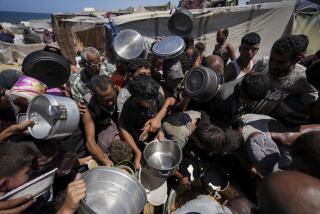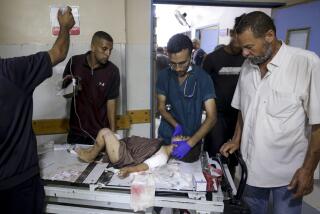Iraqis Round Up Foreigners; U.N. Adopts Broad Sanctions : Persian Gulf: Hundreds are bused from Kuwait to Baghdad, including 28 Americans. Saudi troops brace for a possible invasion.
- Share via
CAIRO — Iraqi soldiers rounded up hundreds of foreigners in Kuwait on Monday and began transporting them to Iraq, while persistent reports of a threatening Iraqi troop presence at the Saudi Arabian border escalated military tensions in the region.
In Washington, the Bush Administration said that 28 Americans were among an estimated 366 foreigners taken from two hotels in the Kuwaiti capital and placed on buses for Baghdad, where analysts said they could be held to discourage an American air strike.
A large number of the detainees--including Britons, West Germans and a Spaniard in addition to the Americans--appeared to have been passengers on a British Airways flight that was stranded at Kuwait Airport after last Thursday’s invasion, according to the British Foreign Office in London.
British officials expressed hope that the travelers would be permitted to leave Iraq after their arrival in Baghdad and said that none of the detainees appeared to be in danger. At the State Department, spokeswoman Margaret Tutwiler said it was too early to consider the travelers as hostages, but she stressed that American officials “hold Iraq responsible for their safety.”
At the United Nations, the Security Council, in its strongest such action in 23 years, adopted a comprehensive package of trade and military sanctions against Iraq, including a ban on oil and other exports from Iraq and Kuwait. Iraq, which is believed to have launched the invasion of Kuwait in a bid to increase its oil revenues, earns $11 billion a year from petroleum sales, representing nearly all its foreign-currency earnings.
Defense Secretary Dick Cheney conferred with Saudi Arabia’s King Fahd in Riyadh about possible military options should Iraqi troops cross the Kuwaiti-Saudi frontier. Diplomatic sources said that Saudi Arabia has deployed at least one armored brigade from a military base about 50 miles south of the border.
For its part, Iraq announced that it has halted the flow of export oil through one side of twin Iraqi pipelines that pass through Turkey to the Mediterranean Sea and had reduced the flow through the other side by more than half because of decreased demand.
Secretary of State James A. Baker III will make an emergency trip to Turkey this week to discuss the pipeline issue with the Ankara government, and diplomatic sources in the region said a key purpose of Cheney’s visit to Saudi Arabia is to reassure Saudi officials of American military protection. U.S. officials said that it was not certain whether Cheney would travel on to other Middle East capitals before returning to Washington.
In Baghdad, Iraqi officials notified the capital city’s 4 million residents to be prepared to evacuate, and an Iraqi journalist interviewed by telephone from Amman, Jordan, said “precautions are under way” throughout the Iraqi capital for any U.S. air strike.
However, several sources said the United States is likely to think carefully before any attack on Iraq because of the 500 Americans who live there. Recalling the 1986 bombing raid on Tripoli, Libya, one official explained: “We have people in Baghdad, whereas we did not have people in Tripoli.”
The State Department said that Iraq appears to be increasing its presence near the Saudi border, and White House spokesman Marvin Fitzwater declared that it is “clearly in the national interest to stop Saddam Hussein,” the Iraqi president.
“The situation in the (Persian) Gulf remains extremely serious,” Fitzwater said. “There is no information suggesting that Iraqi military units are departing Kuwait. To the contrary, the Iraqi military presence throughout Kuwait, including along the Saudi border, remains extremely large and threatening.”
Diplomatic sources in the gulf said there were no signs of an imminent confrontation along the Saudi border, but they added that Saudi troops appeared to be deploying away from bases in the region in order to be dispersed from central military locations in the event of an Iraqi strike.
“They want to be in the field--just like a boat wants to be at sea rather than in port in the event of an attack,” one official in Saudi Arabia said. “When you’re in a base, you’re all sitting together, and you’re in fact inviting a preventive attack.”
Iraqi Airways evacuated 300 Iraqis from Cairo to Amman on Monday on two unscheduled Boeing 747 flights, according to an Egyptian Foreign Ministry official. Egyptian officials said they believed the move was a response to rapidly deteriorating relations between the two countries.
Iraq’s ambassador here told Egyptian officials that Iraq was simply taking vacationing tourists home. But a Foreign Ministry source said that Egypt fears Iraq may be planning to take action against the 1.5 million Egyptians working in Iraq and does not want to leave room for retaliation.
“He’s treating our people there as prisoners, and he’s afraid we will do the same thing with his people,” this official said. “It’s a war step.”
A spokesman at the Iraqi Embassy in Cairo confirmed the flights but said he could not say why his countrymen were evacuated.
As the economic chokehold on Iraq tightened Monday, oil analysts said Baghdad’s decision to cut back exports through its trans-Turkey pipelines reflected in large part dwindling markets for Iraqi petroleum in the face of a spreading embargo movement and could be expected to cut Iraq’s total crude oil exports in half. These exports, through all channels, recently had been running at about 2.7 million barrels per day.
After the Security Council vote Monday, President Bush called for “full and total” implementation of the global sanctions. “These sanctions will be enforced, whatever it takes,” Bush said at a Washington news conference with British Prime Minister Margaret Thatcher and NATO Secretary General Manfred Woerner.
In response to the squeeze on petroleum in the Persian Gulf, world oil prices jumped another $3 a barrel Monday to their highest level in more than four years. Analysts predicted the reduction in flows through the Turkish pipelines could translate into a shortfall in the world market of at least 4 million barrels a day.
U.S. and other North Atlantic Treaty Organization officials also have been stepping up pressure against Turkey and Saudi Arabia to shut down the pipelines across their territories through which Iraq exports 90% of its crude. Both countries have expressed private nervousness over an increasingly belligerent Hussein, who has threatened swift retaliation against any nation that threatens Iraq’s security.
In Baghdad, Hussein summoned American charge d’affaires Joseph Wilson and emphasized that Iraq has no plans to invade Saudi Arabia, but he warned the United States “against any behavior that destabilizes the region,” according to the Iraqi News Agency.
“Iraq (is) capable of defending its sovereignty, interests and rights and expresses its readiness for sacrifice,” the agency quoted Hussein as saying.
State Department spokeswoman Tutwiler said that Wilson, in a meeting that lasted several hours, raised the issue of the 3,000 Americans in Kuwait and the 500 living in Iraq, in addition to demanding that Iraq withdraw its troops from Kuwait and restore the ousted government of that tiny emirate.
In Washington, Assistant Secretary of State John Kelly summoned Iraqi Ambassador Mohammed al Mashat to try to establish the whereabouts of the 28 Americans who were among the foreigners rounded up for transport to Iraq.
Kuwaiti officials and several military analysts said it appears Hussein is attempting to bring foreign nationals into Baghdad and may well transfer them to outlying military installations to discourage an American air strike.
“It is a hostage situation,” declared Heino Kopietz, a London-based Middle East specialist. “They stop being hostages when they’re out of the country.”
Kopietz added that Hussein “doesn’t have to threaten them. The fact that they’re in his hands, and given the record he has, you don’t have to be very bright to figure out what he could do to them.”
Reports have been sketchy in the past several days from Kuwait. Its borders and airport have remained closed and its international telephone lines have been cut off since Iraqi troops stormed through the country early last Thursday and installed a proxy government.
But a Swedish engineer who was among a growing number of Kuwaiti residents fleeing by car into Saudi Arabia said that he, like others, became concerned for the safety of his family with the Iraqi troops’ spread throughout the country.
The engineer, Mikael Wiberj, said he saw no Iraqi soldiers except those manning three checkpoints along the coastal road as he drove toward the border Sunday with his wife and two children.
“I wouldn’t call our departure an adventure,” Wiberj said in a telephone interview from his hotel in Bahrain. “Just a peaceful drive out of Kuwait.”
Wiberj, an employee of Bofors Electronics Co., said two young women, an American and a Canadian, were turned back at the Saudi border crossing, which he said was manned only by Saudis.
“They (the women) seemed very, very nervous,” he said. Wiberj said he did not know their names or why they were denied entry into Saudi Arabia.
With his wife, Helena, Wiberj had lived for 18 months in a suburb south of the Kuwaiti capital and did not see any fighting. However, he said, he heard the bombing of the airport and became concerned for his family’s safety.
When a group of Iraqi officers, which he estimated at nearly 100, took quarters at a hotel near his home, he became more alarmed. “They began to ask the local people for food,” he said, and he feared that it was a sign that discipline was breaking down.
“We thought it was worth a try,” he said of his decision to leave.
Times staff writer Nick B. Williams Jr., in Dubai, United Arab Emirates, contributed to this story.
THE CRISIS ESCALATES United States: The U.N. Security Council imposes mandatory economic sanctions and an arms embargo against Iraq, including a world-wide ban on its oil exports.
Stocks plunge on the New York Market.
President Bush steps up diplomatic consultations in a bid to further isolate Iraq. President meets British Prime Minister Margaret Thatcher. Kuwait: Iraqi invaders round up foreign visitors, including Britons, West Germans and 28 Americans, from hotels in Kuwait city. Some were taken to Iraq.
The British and U.S. visitors were staying at a transit hotel at Kuwait airport and at the SAS hotel in Kuwait city. Britain: Oil prices soar.
London’s Financial Times Stock Exchange index of 100 leading shares nosedived. Gold remained in the doldrums. Turkey: FAced with falling demand, Iraq closes half of a twin pipeline across Turkey that carries much of its oil exports to a Mediterranean port.
It cuts the flow in the other half of the line to 70% of capacity. Secretary of State James A. Baker III is due in Turkey later this week. Saudi Arabia: Secretary of Defense Dick Cheney is in the Saudi capital, for talks on ways to defend that country. Japan: Markets plunge after Japan joined the West in banning imports of Iraqi and Kuwaiti oil. Tokyo’s Nikkei stock market index tumbled 3.1% Monday.
Source: Times Wire Services / Los Angeles Times
More to Read
Sign up for Essential California
The most important California stories and recommendations in your inbox every morning.
You may occasionally receive promotional content from the Los Angeles Times.












